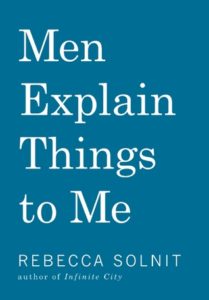Highlights & Annotations
“I had just begun to make the case for hope in writing, and I argued that you don’t know if your actions are futile; that you don’t have the memory of the future; that the future is indeed dark, which is the best thing it could be; and that, in the end, we always act in the dark. The effects of your actions may unfold in ways you cannot foresee or even imagine. They may unfold long after your death.” (93)
“To me, the grounds of hope are simply that we don’t know what will happen next, and that the unlikely and the unimaginable transpire quite regularly. And that the unofficial history of the world shows that dedicated individuals and popular movements can shape history and have, though how and when we might win and how long it takes is not predictable.” (94)
“Woolf is celebrating getting lost, not literally lost as in not knowing how to find your way, but lost as in open to the unknown, and the way that physical space can provide psychic space.” (98)
